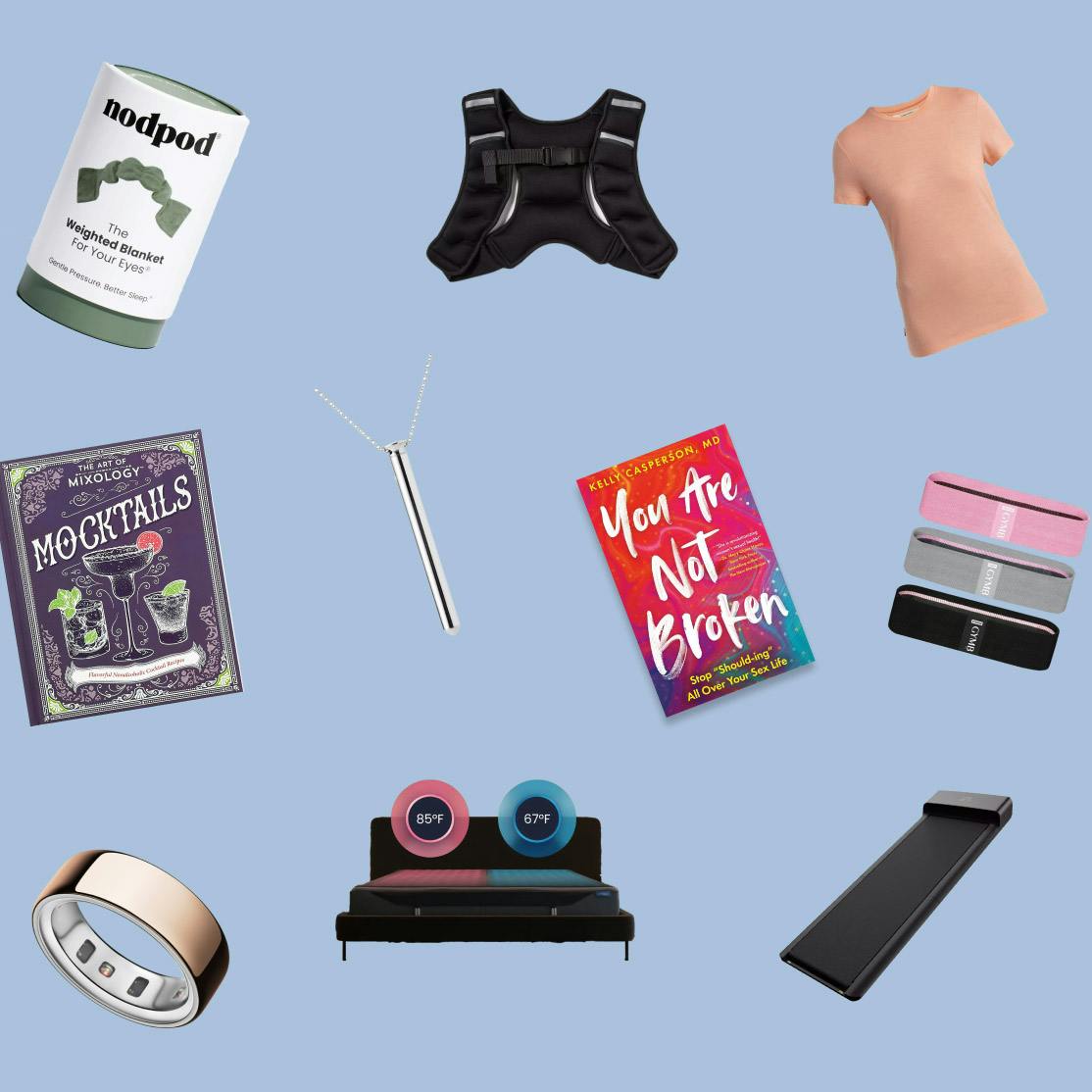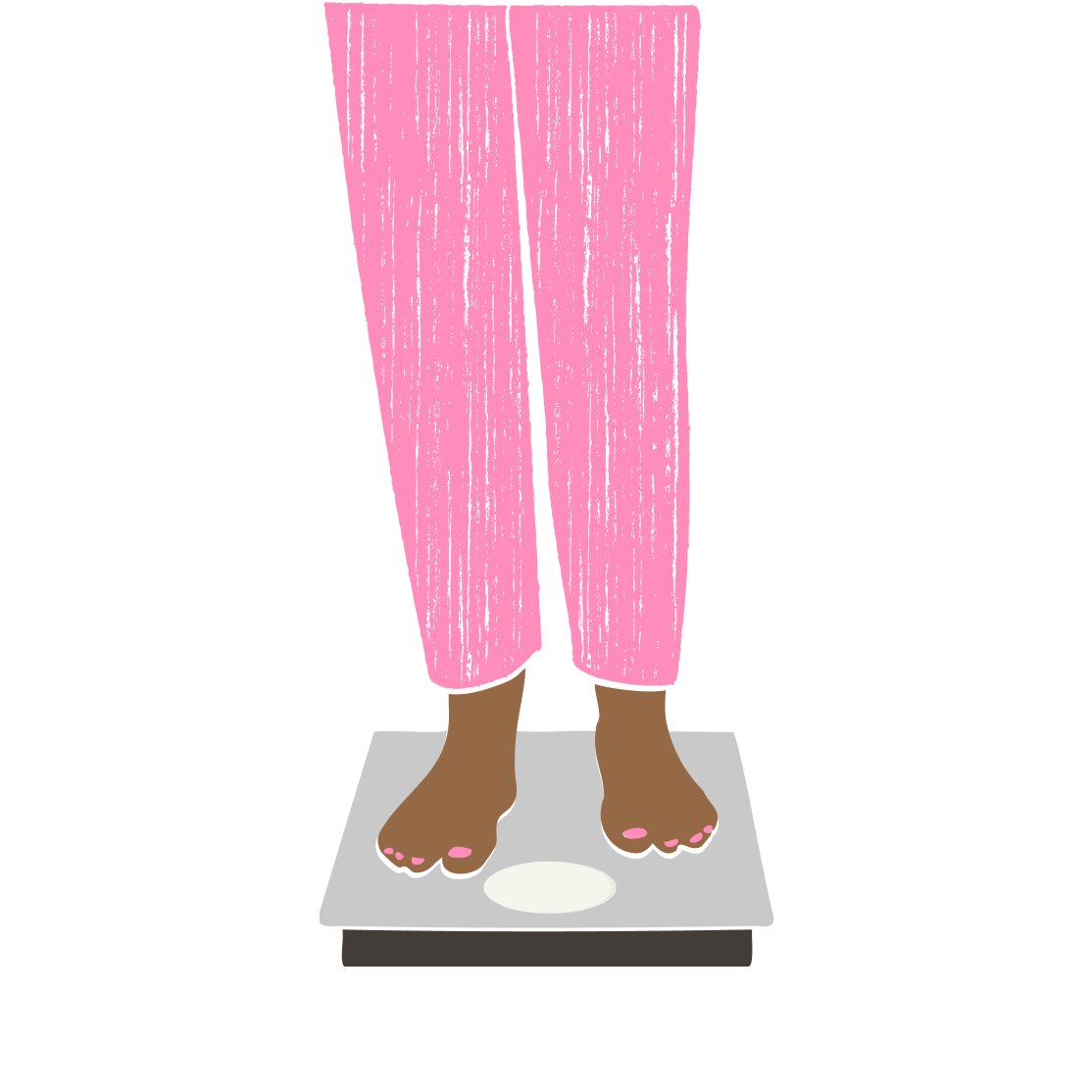Whether you’ve got a friend or family member in perimenopause or menopause, it’s likely that everything about menopause is top-of-mind lately—including the question of what gift to get a menopausal woman. From gifts and gadgets that help with hot flashes and insomnia to prezzies that protect her long-term health, we’ve got clinician-backed recommendations that are useful, thoughtful, and effective. ˛
For your 6am walking partner: Prodigen weighted vest

The hottest midlife fashion accessory just may be the weighted vest. Once confined to the gym, this fitness essential has now been spotted on everyone from Dr. Mary Claire Haver to Katie Couric and Midi’s CEO and founder, Joanna Strober. (See her wearing one, below!) But are they worth a wear? Yes, says Melissa Boll, CNM, a Midi clinician and nurse practitioner manager.

"Weighted vests have been shown to improve bone formation, balance, and strength," says Boll. "Since bone density can decrease during menopause, incorporating a weighted vest can be an effective complement to hormone therapy."
Boll recommends starting with a vest weighing about 5 to 10% of your body weight, ideally worn during activities like walking and strength training. She suggests aiming for three 10-minute walks per week as a starting point, though she emphasizes "anything is better than nothing."
Why Midi loves it: “Weighted vests are a great gift, especially for women who chose walking as their form of exercise. Wearing a weighted vest is an easy way to up the intensity of your walking workout and is an easy form of strength training.I like that this vest has double straps so I feel more secure in it.”—Stephanie Breining, WHNP-BC, Midi clinician
For someone who could really use a good night’s sleep: Chillipad

During menopause, the list of things that stand between you and a good night’s rest is long: night sweats, body aches, anxiety, waking up to pee, and an increased risk of sleep apnea, to name a few. But getting enough shut-eye is a must.
Poor sleep is associated with increased risk of coronary heart disease, osteoporosis, and decreased cognitive function. Plus, a lack of sleep can worsen other menopause symptoms (hot flashes, brain fog, moodiness and weight gain, for starters). So anything that can help you get more rest—whether cognitive behavior therapy, cutting back on caffeine and alcohol, or the Chillipad—is worthwhile.
Why Midi loves it: “Chilipad is a great way to manage your own temperature separately from your partner. Many women in menopause report that their husbands complain of freezing bedroom temperatures. With the Chilipad, women can cool their side of the bed when necessary without changing anything on their partner's side. So innovative!” —Sydney Hernandez, FNP, a Midi clinician
Get 20% off your Chillipad purchase when you use this link
For anyone working a 9-5 (and then some): Maksone under-desk treadmill

The reasons to focus on getting in your steps during menopause? So many. Not only does exercise help counter weight gain and fat accumulation, it can also promote quality sleep and help alleviate the mental health symptoms that undermine healthy eating. Additionally, consistent low-impact exercises like gentle walking help keep the joints lubricated and flexible to find menopause-driven joint pain while also improving cardiovascular health.
An under-the-desk treadmill can help keep you moving on days when you have meetings back to back. And it may help boost creativity and productivity since research has shown that walking can help jiggle loose those pearls of inspiration.
Why Midi loves it: “My favorite walking pad! Doesn't break the bank but it has been reliable, quiet, and helpful for stress! It’s absolutely priceless for easing the morning stiffness and getting in my steps while working a desk job.” —Sarah Wallis, MSN, WHNP-BC, CNM, MSCP, Midi clinician
For the friend who can often be found standing front of an open freezer: Icebreaker t-shirt

Hot flashes occur when the brain’s thermoregulatory center (the hypothalamus, which controls heat production and loss), struggles to do its work. As estrogen levels change, the hypothalamus becomes more sensitive to slight changes in body temperature. Thrown off by hormone fluctuation, the brain thinks the body is too warm and triggers a series of mechanisms meant to bring down temperature, including expanding blood vessels near the skin’s surface, increasing blood flow and heart rate, and activating sweat glands. So, essentially, a hot flash is your body doing a great job of cooling you off when you’re not actually overheated.
The most effective way to manage hot flashes is with hormone replacement therapy, but staying away from tight, non-breathable clothing can help, as well as sleeping in a cool bedroom, and using fans whenever and wherever you need them. Merino wool layers are a particularly good choice, because they’re lightweight and breathable.
Why Midi loves it: “I highly recommend merino wool tops and leggings. They keep you cool AND warm through the hot flashes and cold spells. These are surprisingly soft, and I've comfortably worn them summer and winter! Best of all, they are amazingly funk-resistant.” —Sarah Wallis, MSN, WHNP-BC, CNM, MSCP, Midi clinician
For the friend who loves to look at stats: Oura Ring

Tracking your perimenopause or menopause symptoms and data—whether with a smart ring like Oura Ring, a journal, or something else—is a smart idea. The more information you can provide your clinician, the better equipped they will be to guide you toward the most effective treatment for your symptoms.
Why Midi loves it: “It’s a splurge, but my patients love it for tracking their sleep and temperature trends. It looks at lots of health metrics and looks stylish!” —Leslie Turner, WHNP, CNM, Midi clinician
Get 10 % off your Oura purchase when you use this link
For the friend who needs a bit of help getting to sleep NodPod

If you struggle to fall asleep, the NodPod might just become your new bedtime best pal. This genius weighted sleep mask uses gentle pressure to calm your mind, kind of like a… hug for your face. It’s super soft, perfectly cozy, and doesn’t have those annoying straps that dig into your hair. Plus, it blocks out all the light, making it way easier to drift off.
Why Midi Loves it: “Getting good sleep can be challenging for women in menopause and perimenopause. We know the evidence about weighted blankets helping with sleep, and the Nodpod is like a weighted blanket for the eyes. Plus, it offers some light blocking and even noise cancelling—and it’s packable!” —Kathleen Jordan, MD, Midi’s Chief Medical Officer
For the friend who hates the gym but is ready to get strong: Gymbee Premium Resistance Bands

If you weren’t already paying attention to your bone health, now’s the time to start, because during and after the menopause transition, women’s risk of osteoporosis and serious bone fractures jumps up. Here’s what’s going on: Throughout the first few decades of life, estrogen helps to maintain bone strength and density by promoting new bone formation. But after age 50, a decrease in estrogen levels—combined with normal wear and tear—can cause osteopenia, or lower than normal bone density. Without treatment, osteopenia may progress to full-on osteoporosis, a disease that causes bones to become weak, which makes fractures more likely. A good place to focus: Your exercise routine. By adding in bone-building workouts—and subtracting moves that could increase the risk of fractures—you can help prevent, and actually reverse, bone loss.
Why Midi loves it: “Resistance training has been shown to impact heart health, bone health, and decrease the risk of muscle wasting and fragility. There are even studies that suggest progressive resistance training might help reduce hot flashes. You don’t have to break the bank to make resistance training part of the menu. A set of resistance bands are easy to store, pack and even keep at your desk. There are tons of exercises that can be done while sitting. And the person on the other end of the Zoom will have no idea. I love these cloth ones since they don’t dig into or pinch your skin.” —Lauren Streicher, MD, Midi’s Medical Director of Community Education and Outreach
For the friend who might want a stylish little helper: Vesper Vibrator Necklace

Over 50% of menopause women have difficulty having an orgasm due to changes in clitoral nerve endings. When that happens, a vibrator isn’t a toy, it’s a tool to facilitate the ability to orgasm.
Why Midi loves it: “You can buy a cheap vibrator at the corner store, but this is a gift, so I would think you would want to give something a little more special. And who doesn’t love a bauble? The Vesper is a very cool necklace that doubles as a vibrator on the go.” —Lauren Streicher, MD, Midi’s Medical Director of Community Education and Outreach
For the friend loves to entertain, but wants sober options: The Art of Mixology: Mocktail

Looking to level up your hosting game? The Art of Mixology: Mocktail is the ultimate guide to creating chic, alcohol-free drinks that still feel totally indulgent. Packed with stunning photos and easy-to-follow recipes, it’s perfect for impressing guests or treating yourself to something fancy. Whether you’re into fruity refreshers or creamy concoctions, this book has a mocktail for every mood—no hangover required.
Why Midi loves it: “We know that alcohol is a risk for cancer such as breast and colon and that the associated calories can add to weight gain. A great alternative that may help stave off cancer is a mocktail instead!” Mindy Goldman, MD, Midi’s Chief Clinical Officer
For the friend whose intimate life needs a boost: You Are Not Broken

When it comes to health, knowledge really is power. And yet many people experience menopause without a clear understanding of what is going on. In one survey of 3,100 women, 57.6 percent of those under the age of 40 say they don’t feel at all informed about menopause. It’s not their fault: 80 percent of OB/GYNs have no training in menopause, so there can be a lack of information given out, especially at the beginning of perimenopause when symptoms are still mild or vague, and your periods haven’t stopped.
It can help you feel more prepared if you read some books on menopause written by experts who specialize in women’s hormonal health, and have seen it all in practice. When urologist Dr. Casperson felt unable to help her patients who struggled with sex, she decided to learn everything she could about the intersection of hormones and sexuality. And she poured all of that insight into this book, which will teach you everything you need to know to have better sex, whether it’s fully understanding your anatomy or shifting your mindset.
Why Midi loves it: "Dr Kelly Casperson's approach to sexual health for women is approachable and thoughtful. Through her book and our conversations I have had so many "aha moments" that are takeaways for my own life. Dr Casperson is a powerhouse with a warm smile - exactly what women need to demystify and destigmatize something all women should have access to–great sex!" —Holly Rillinger, celebrity trainer and Founder of LIFTED
If you’re in perimenopause or menopause and want guidance from clinicians who specialize in women’s midlife health, book a virtual visit with Midi today.
Hormonal change is at the root of dozens of symptoms women experience in the years before and after their period stops.
Our trained menopause specialists can help you connect the dots to guide you towards safe, effective solutions.
Whether you need personalized guidance or a prescription routine to tackle symptoms—including brain fog, hot flashes, sleep trouble, mood swings, and weight gain—we’ve got you covered.
Midi’s mission is to revolutionize healthcare for women at midlife, wherever they live and whatever their health story. We believe that starts with education, to help all of us understand our always-changing bodies and health needs. Our core values guide everything we do, including standards that ensure the quality and trustworthiness of our content and editorial processes. We’re committed to providing information that is up-to-date, accurate, and relies on evidence-based research and peer-reviewed journals. For more details on our editorial process, see here.
 Midi Team
Midi Team


